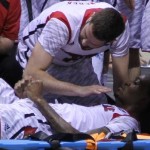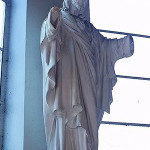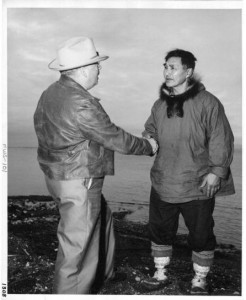Hands are meant for holding.
When it happened, some turned away, others vomited, more cried, a few collapsed.
But one, Luke Hancock, ran to hold his friend’s hand, praying for him. [1]
 In 2013 Louisville was playing in a basketball playoff game against Duke. One of the Louisville players, Kevin Ware, suffered a gruesome compound fracture; the tibia had broken, protruding through the skin. Ware screamed in pain. Paramedics ran to the scene.
In 2013 Louisville was playing in a basketball playoff game against Duke. One of the Louisville players, Kevin Ware, suffered a gruesome compound fracture; the tibia had broken, protruding through the skin. Ware screamed in pain. Paramedics ran to the scene.
But Luke Hancock was the first one there, hand-in-hand, praying for his friend.
What do we do when we see others in pain, anguish, turmoil, or trouble? “You Find Out Who Your Friends Are” is a country song that should express our answer. Jeremiah was the only prophet who rushed to the aid of Judah. He wept for his beloved city, Jerusalem (8.18-9.3, 13.15-17). Jeremiah stood by his suffering countrymen for forty years when everyone else turned away.
 Jesus’ famous story of the Samaritan who stopped by when others passed by should be how we stand by those who suffer (Luke 10.25-37). Acts 4.32-37 tells that first century Christians who had seen others in need came alongside to help. James 2.14-17 reminds readers that we should help others by meeting their physical needs. 1 John 3.16-18 implores Christians that our love is shown by offering our material goods to those who have none. Deuteronomy 15.7-11 explains that being “tight fisted” toward financial sufferers is wrong; instead, we should be “open handed.”
Jesus’ famous story of the Samaritan who stopped by when others passed by should be how we stand by those who suffer (Luke 10.25-37). Acts 4.32-37 tells that first century Christians who had seen others in need came alongside to help. James 2.14-17 reminds readers that we should help others by meeting their physical needs. 1 John 3.16-18 implores Christians that our love is shown by offering our material goods to those who have none. Deuteronomy 15.7-11 explains that being “tight fisted” toward financial sufferers is wrong; instead, we should be “open handed.”
A statue of Jesus stands outside Christ the King Church in San Diego. The almost life-size figure is like others one might see in a cemetery, on someone’s lawn, or near a church building with one exception: the statue has no hands. It seems vandals them cut off.
 The pastor decided to leave the statue as it was. A sign was erected next to the Christ sculpture, later replaced by a permanent plaque intended for Christians: “I have no hands but yours.” All offers to repair the statue were turned down. [2]
The pastor decided to leave the statue as it was. A sign was erected next to the Christ sculpture, later replaced by a permanent plaque intended for Christians: “I have no hands but yours.” All offers to repair the statue were turned down. [2]
Hands were important to Teresa of Avila (1515–1582) whom is said to have written,
Christ has no body but yours
No hands, no feet on earth but yours
My “hands” of help might take many forms with my neighbors in need:
-
Did my friend just “lose his job” needing connections toward employment?
-
Has someone I know just dealt with death in the family? Do they need my listening ear, my cooking, or my shoulder to cry on?
-
Can I pay for some service, expense, or necessity for someone who cannot pay?
-
A dread disease has just claimed it latest victim. Can I care for the family’s children giving time for doctor’s visits, sleep, or distraction?
Reporters asked Luke Hancock why he ran to hold his friend’s hand when others looked away.
Hancock said he did not want his friend to suffer alone.
May we rush to aid other sufferers as we are able, becoming the hands of Jesus.
Mark is grateful for all who have held his hand in time of need. Dr. Mark Eckel is president of The Comenius Institute and will be teaching about suffering at Crossroads Community Church this coming fall.
[1] Adam Himmelsbach, “Kevin Ware on Louisville Teammate ‘Who Touched My Heart’,” USA Today Online 4 April 2013, https://www.usatoday.com/story/sports/ncaab/bigeast/2013/04/04/luke-hancock-kevin-ware-support-broken-leg/2052185/
[2] Sam Lucero, “Immigrants and Open Arms,” The Compass News Online 30 October 2013, https://www.thecompassnews.org/2013/10/immigrants-open-arms/
Picture credits:
https://www.public-domain-image.com/free-images/vintage-photography/two-friends-shaking-hands-old-photo
https://www.usatoday.com/story/sports/ncaab/bigeast/2013/04/04/luke-hancock-kevin-ware-support-broken-leg/2052185/
https://en.wikipedia.org/wiki/File:Jan_wijnants_-_parable_of_the_good_samaritan.jpg
https://www.grovebaptist.co.uk/thought/tftm1111.htm


Love this article, Dr. Eckel.
Amen! Looking forward to reading material drawn from your teaching about suffering at Crossroads Community Church this coming fall.